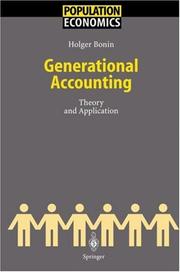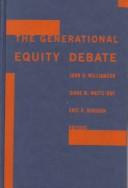| Listing 1 - 10 of 142 | << page >> |
Sort by
|

ISBN: 3540422668 Year: 2001 Publisher: Berlin : Springer,
Abstract | Keywords | Export | Availability | Bookmark
 Loading...
Loading...Choose an application
- Reference Manager
- EndNote
- RefWorks (Direct export to RefWorks)
Book
Year: 1995 Publisher: Cambridge, Mass. National Bureau of Economic Research
Abstract | Keywords | Export | Availability | Bookmark
 Loading...
Loading...Choose an application
- Reference Manager
- EndNote
- RefWorks (Direct export to RefWorks)
This paper shows how changes in generational accounts relate to the generational incidence of fiscal policy. To illustrate the relationship, it uses the Auerbach-Kotlikoff Dynamic Life-Cycle Simulation Model to compare policy-induced changes in generational accounts with actual changes in generations' utilities. The paper considers a wide range of policies in closed and small open economies as well as economies with and without capital adjustment costs. In general, changes in generational accounts appear to provide fairly good approximations to generations' actual changes in utilities. The approximations are better for living generations. They are worse for policies that involve significant changes in the degree of tax progressivity and for economies with sizable capital- adjustment costs. Finally, generational accounting needs to be adjusted in the case of small open economies to take into account the fact that the incidence of corporate taxation is on labor. The method of adjustment is simply to allocate changes in corporate tax revenues to generations in proportion to their changes in labor supply.
Book
Year: 2000 Publisher: Washington, D.C. : Congressional Budget Office,
Abstract | Keywords | Export | Availability | Bookmark
 Loading...
Loading...Choose an application
- Reference Manager
- EndNote
- RefWorks (Direct export to RefWorks)
Book
Year: 2001 Publisher: Cambridge, Mass. National Bureau of Economic Research
Abstract | Keywords | Export | Availability | Bookmark
 Loading...
Loading...Choose an application
- Reference Manager
- EndNote
- RefWorks (Direct export to RefWorks)
This paper extends the Ramsey model's normative analysis to issues of generational welfare and intergenerational transfers. A planner, who maximizes the discounted welfare of an endless stream of generations, is intrinsically biased against larger cohorts, which are more costly to provide utility. Imperfect production substitutability produces a market bias against baby booms as well, lowering their lifetime income. The market bias, however, tends to be greater than that of the planner, who provides the baby boom cohort with more favourable lifetime transfers. Intuitively, the baby boom benefits from temporarily reduced elderly dependency, allowing greater lifetime consumption relative to lifetime income. Declining population growth leads to rising elderly dependency, which the planner supports with increasing intergenerational transfers. Secularly rising social security taxes, and declining lifetime returns, with a baby boom cohort receiving more favourable treatment than their heavily burdened successors, are consistent with the wishes of a social planner in an environment with declining population growth.
Book
Year: 1999 Publisher: Cambridge, Mass. National Bureau of Economic Research
Abstract | Keywords | Export | Availability | Bookmark
 Loading...
Loading...Choose an application
- Reference Manager
- EndNote
- RefWorks (Direct export to RefWorks)
Against a background of projections of sharply increasing elderly dependency rates, workers in the major industrial economies are apprehensive that their social security benefit entitlements will be cut before or after they retire, leaving them with inadequate retirement income. This paper looks at recent benefit rule changes in the G7 countries to see what can be learned about such political risk in PAYG pension systems. From this small sample, I find that projections of rising costs under current rules are inducing reforms, and that these reforms often have a major impact on the present discounted value of promised benefits for middle-aged and younger workers. Usually, however, the benefits of the retired and those nearing retirement are protected. The phasing in of benefit cuts raises the question as to why younger workers are willing to take significant cuts in their implicit wealth while protecting the currently old. One possible answer is explored through a simple model: these workers fear even larger cuts in their benefits if the tax burden on future workers rises too high.
Book
ISBN: 3732993965 Year: 2020 Publisher: Berlin, Germany : Frank & Timme GmbH,
Abstract | Keywords | Export | Availability | Bookmark
 Loading...
Loading...Choose an application
- Reference Manager
- EndNote
- RefWorks (Direct export to RefWorks)
Book
Year: 2001 Publisher: Cambridge, Mass. National Bureau of Economic Research
Abstract | Keywords | Export | Availability | Bookmark
 Loading...
Loading...Choose an application
- Reference Manager
- EndNote
- RefWorks (Direct export to RefWorks)
Throughout the world, population aging is a major challenge that will continue well into the 21st century. While the patterns of the demographic transition are similar in most countries, timing differs substantially, in particular between industrialized and less developed countries. To the extent that capital is internationally mobile, population aging will therefore induce capital flows between countries. In order to quantify these international capital flows, we employ a multi-country overlapping generations model and combine it with long-term demographic projections for several world regions over a 50 year horizon. Our simulations suggest that capital flows from fast-aging industrial countries (such as Germany and Italy) to the rest of the world will be substantial. Closed-economy models of pension reform are likely to miss quantitatively important effects of international capital mobility.
Demographic transition. --- Generational accounting. --- Capital movements.
Book
ISBN: 9781032046464 1032046449 9781032046440 1032046465 Year: 2023 Publisher: London, England: Routledge,
Abstract | Keywords | Export | Availability | Bookmark
 Loading...
Loading...Choose an application
- Reference Manager
- EndNote
- RefWorks (Direct export to RefWorks)
"Constructed as a psychoanalytic diary, the authors of this book reflect on clinical observations from their work with patients during the COVID-19 pandemic, tracking these singular experiences to arrive at broader understanding of the psychological characteristics of collective trauma. Based on the theoretical framework of their previous book, which focuses on the transgenerational, psychological effects of large-scale social-historical traumas and introduced new concepts such as the 'Transgenerational Atmosphere', the authors here explore the trauma itself, especially those deep traumas which affect a large group of people or even the whole of humanity, including pandemics, natural disasters, terrorism and war. In this volume, the authors progress toward the potential immediate and long-term psychological effects of such trauma, including the possibility of the activation of unprocessed transgenerational traumatic experiences, but also the potential for growth. Rich in clinical material and methodological suggestions, this book will appeal to mental health professionals, including psychiatrists, psychologists, psychoanalysts, and social workers, in addition to professors in other academic disciplines, such as sociology, history, philosophy and anthropology"--
COVID-19 Pandemic, 2020 --- -COVID-19 (Disease) --- Generational trauma
Book
Year: 1999 Publisher: Cambridge, Mass. National Bureau of Economic Research
Abstract | Keywords | Export | Availability | Bookmark
 Loading...
Loading...Choose an application
- Reference Manager
- EndNote
- RefWorks (Direct export to RefWorks)
Are market and voting institutions capable of producing optimal intergenerational risk-sharing? To study this question, we consider a simple endowment economy with uncertainty and overlapping generations. Endowments are stochastic; thus it is possible to increase the welfare of every generation using intergenerational transfers that might depend on the state of the world. We characterize the transfers that are necessary to restore efficiency and compare them to the transfers that take place in markets and voting institutions. Unlike most of that literature, we study both ex-ante and interim risk-sharing. Our main conclusion is that both types of institutions have serious problems. Markets cannot generate ex-ante risk-sharing because agents can trade only after they are born. Furthermore, markets generate interim efficient insurance in some but not all economies because they cannot generate forward (old to young) intergenerational transfers. This market failure, in theory, could be corrected by government intervention. However, as long as government policy is determined by voting, intergenerational transfers might by driven more by redistributive politics than by risk sharing considerations. Successful government intervention can arise, even though agents can only vote after they are born, but only if the young determine policy in every election.

ISBN: 0231112858 9780231112857 Year: 1999 Publisher: New York (N.Y.) : Columbia university press,
Abstract | Keywords | Export | Availability | Bookmark
 Loading...
Loading...Choose an application
- Reference Manager
- EndNote
- RefWorks (Direct export to RefWorks)
| Listing 1 - 10 of 142 | << page >> |
Sort by
|

 Search
Search Feedback
Feedback About UniCat
About UniCat  Help
Help News
News